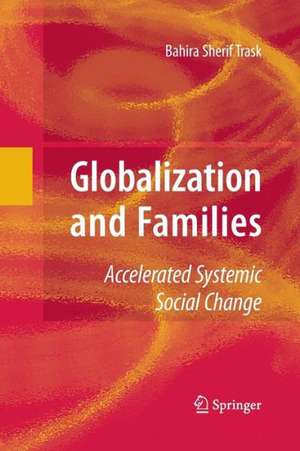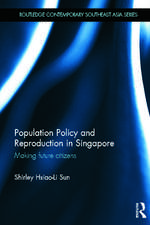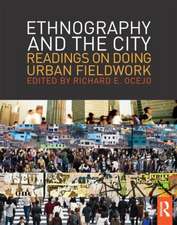Globalization and Families: Accelerated Systemic Social Change
Autor Bahira Trasken Limba Engleză Paperback – 3 sep 2014
Despite a general acknowledgement of the complexities and social significance inherent in globalization, most analyses remain top-down, focused on the global economy, corporate strategies, and political streams. This limited perspective on globalization has had profound implications for understanding social life. The impact of globalization on gender ideologies, work-family relationships, conceptualizations of children, youth, and the elderly have been virtually absent in mainstream approaches, creating false impressions that dichotomize globalization as a separate process from the social order. Moreover, most approaches to globalization and social phenomena emphasize the Western experience. These inaccurate assumptions have profound implications for families, and for the globalization process itself. In order to create and implement programs and policies that can harness globalization for the good of mankind, and that could reverse some of the deleterious effects that have affected the world’s most vulnerable populations, we need to make the interplay between globalization and families a primary focus.
| Toate formatele și edițiile | Preț | Express |
|---|---|---|
| Paperback (1) | 555.78 lei 39-44 zile | |
| Springer – 3 sep 2014 | 555.78 lei 39-44 zile | |
| Hardback (1) | 645.14 lei 6-8 săpt. | |
| Springer – 4 dec 2009 | 645.14 lei 6-8 săpt. |
Preț: 555.78 lei
Preț vechi: 694.72 lei
-20% Nou
Puncte Express: 834
Preț estimativ în valută:
106.35€ • 110.82$ • 88.06£
106.35€ • 110.82$ • 88.06£
Carte tipărită la comandă
Livrare economică 31 martie-05 aprilie
Preluare comenzi: 021 569.72.76
Specificații
ISBN-13: 9781489984722
ISBN-10: 1489984720
Pagini: 240
Ilustrații: XVII, 220 p.
Dimensiuni: 155 x 235 x 13 mm
Greutate: 0.34 kg
Ediția:2010
Editura: Springer
Colecția Springer
Locul publicării:New York, NY, United States
ISBN-10: 1489984720
Pagini: 240
Ilustrații: XVII, 220 p.
Dimensiuni: 155 x 235 x 13 mm
Greutate: 0.34 kg
Ediția:2010
Editura: Springer
Colecția Springer
Locul publicării:New York, NY, United States
Public țintă
ResearchCuprins
Theoretical Perspectives and Paradigms.- Globalization as a Dynamic Force in Contemporary Societies.- Approaches to Understanding Families.- Gendered Analyses of Globalization.- Examining Linkages between Globalization and Families.- Global Migration and the Formation of Transnational Families.- Work–Family Intersections in a Globalizing Context.- Global Conceptualizations of Children and Childhood.- Critical Issues Around Global Aging.- Future Challenges and Opportunities.- Nation-States, Transnational Spaces, and Family Linkages.- Debates Around Globalization, Poverty, and Inequality.- Social Change, New Paradigms, and Implications for Families.
Textul de pe ultima copertă
As our world becomes increasingly interconnected through economic integration, technology, communication, and political transformation, the sphere of the family is a fundamental arena where globalizing processes become realized. For most individuals, family in whatever configuration, still remains the primary arrangement that meets certain social, emotional, and economic needs. It is within families that decisions about work, care, movement, and identity are negotiated, contested, and resolved. Globalization has profound implications for how families assess the choices and challenges that accompany this process. Families are integrated into the global economy through formal and informal work, through production and consumption, and through their relationship with nation-states. Moreover, ever growing communication and information technologies allow families and individuals to have access to others in an unprecedented manner. These relationships are accompanied by new conceptualizations of appropriate lifestyles, identities, and ideologies even among those who may never be able to access them.
Despite a general acknowledgement of the complexities and social significance inherent in globalization, most analyses remain top-down, focused on the global economy, corporate strategies, and political streams. This limited perspective on globalization has had profound implications for understanding social life. The impact of globalization on gender ideologies, work-family relationships, conceptualizations of children, youth, and the elderly have been virtually absent in mainstream approaches, creating false impressions that dichotomize globalization as a separate process from the social order. Moreover, most approaches to globalization and social phenomena emphasize the Western experience. These inaccurate assumptions have profound implications for families, and for the globalization process itself. In order to create and implement programs and policies that can harness globalization for the good of mankind, and that could reverse some of the deleterious effects that have affected the world’s most vulnerable populations, we need to make the interplay between globalization and families a primary focus.
Despite a general acknowledgement of the complexities and social significance inherent in globalization, most analyses remain top-down, focused on the global economy, corporate strategies, and political streams. This limited perspective on globalization has had profound implications for understanding social life. The impact of globalization on gender ideologies, work-family relationships, conceptualizations of children, youth, and the elderly have been virtually absent in mainstream approaches, creating false impressions that dichotomize globalization as a separate process from the social order. Moreover, most approaches to globalization and social phenomena emphasize the Western experience. These inaccurate assumptions have profound implications for families, and for the globalization process itself. In order to create and implement programs and policies that can harness globalization for the good of mankind, and that could reverse some of the deleterious effects that have affected the world’s most vulnerable populations, we need to make the interplay between globalization and families a primary focus.
Caracteristici
There are few other books that look at the “macro” influences – such as globalization – on the family Alternatively, globalization researchers don’t have much data on how the “micro” level – such as a family – is affected by globalization Includes supplementary material: sn.pub/extras














